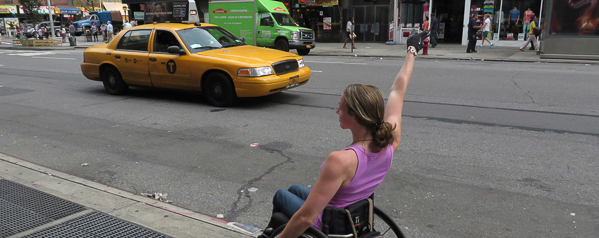
April Coughlin traveled alone through six European countries in 13 days, riding buses, trains and cabs for countless viewpoints of the world. When she wheeled off of the plane at JFK airport in New York City, she was assigned an escort to lead her and other disabled people through customs.
She refused any assistance, but said when she started hightailing it away from the group she was threatened with arrest and heavy fines, forcing her to submit to the role of second-class citizen so commonly given to disabled people in our ableist-minded society.
On March 26, Coughlin gave a speech titled “Disability and Social Justice: The Continued Movement” to a full house in the Student Union multipurpose room at SUNY New Paltz.
“I’ve been waiting for something like this,” Kyle Wightman, a third-year Women, Gender and Sexuality Studies major at SUNY New Paltz said, also voicing concern with what he viewed as a lack of accessibility on campus.
Coughlin was paralyzed from the waist down in a car accident when she was six years old. She has been a self-proclaimed “wheeler” for 29 years, all the while working as “an advocate for access and inclusion” for the disabled community, the world’s largest minority group containing 10 percent of the population.
Johnny Owens, a third-year printmaking major at New Paltz, went to learn “anything new” on the topic, as he believes that disability is the least exposed social injustice.
Portia Altman, the director of the disability resource center at SUNY New Paltz, cited a “lack of staff, a lack of interest and a lack of people versed in these types of issues” as just a few reasons for the delay in public conversation revolving around disability and social justice. She said she reached out to Coughlin after seeing her speak at Vassar College last year.
Coughlin discussed able-bodied privileges in terms of her own life. She grew up in New Paltz, attending the local elementary and high school where she was fully included with her peers thanks to the Individuals with Disabilities Education Act of 1990, which ensures that people receive a free public education regardless of ability.
New Paltz was where she first learned to “enjoy little victories” and to fight for what she believed was her due; when she got her driver’s license, there was no accessible spot for her to park at New Paltz High School. That was the first incident that called for a letter to be written requesting change, and it was successful. Letters written later in her career also made a difference, such as her behest to SUNY Albany to build more accessible bathrooms around campus.
“Everybody should have the right to pee,” Coughlin said with a laugh. She noted that public bathrooms, broken elevators, bells for assistance and sketchy rear entrances are nuisances to her everywhere.
As a middle school English teacher in Brooklyn, she said she realized disability stereotypes were deeply rooted in society. Parents and students alike discredited her capacity as a teacher after one glance at her wheelchair. One parent blatantly told Coughlin that they did not want a person in a wheelchair teaching their child.
Part of Coughlin’s advocacy mission is to change the way society views people with physical disabilities, she said. Her understanding of life as a disabled person has been shaped by her everyday experiences and her education. She is currently working towards a Ph.D at Syracuse University in the inclusive education program and credits her disability studies classes for giving her a language to make sense of her experiences.
Coughlin founded a group for women with spinal cord injuries in New York City, the first of its kind in the country, to spread the words she was empowered by.
In her speech, she encouraged the audience to help change the conversation of those with disabilities. She provided a list of the do’s and don’ts of disability communication. These promoted people to use person-first language, to emphasize that the person owns their disability and not vise versa; discouraged the “infantilization” or baby-treatment of people with disabilities; urged against words that imply tragedy, such as “afflicted,” “suffer” or “unfortunate” and encouraged people to always ask before assisting someone who is disabled.
The word “inspiration” was also discouraged in this section of her speech. Coughlin told the crowd to not “be inspired because I got out of bed this morning.”
Coughlin said she hopes that implementing more inclusive language into society regarding people with disabilities will help move the fight for access and inclusion into the societal spotlight.
“The quest for equality continues. One day at a time,” she said.
